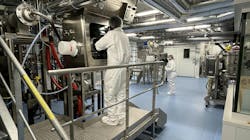California’s life sciences manufacturing sector contracted in 2024: report
Manufacturing-related life sciences jobs in California dropped 3.7% year over year in 2024, according to a new report from the trade association Biocom California. The Bay Area (-6.3%) took the biggest hit last year, followed by San Diego (-5.5%) and Los Angeles (-3%).
However, the bright spot was Orange County, which remains a life sciences manufacturing hot spot in the state, where the job sector grew 2.6% year over year and approximately 50% of the county’s life science payroll jobs were related to manufacturing.
Despite jobs dropping 3.7% last year in California, it is still home to the largest number of manufacturing-related life science jobs in the U.S., according to the report.
“The state leads the nation in biomanufacturing, providing over 141,000 direct life science manufacturing jobs, representing 31.2% of California’s life science payroll employment,” said Biocom California in a press release. By comparison, the trade association said manufacturing jobs nationally comprise an average of 29.7% of life science employment.
Biomanufacturing capabilities “tend to have an outsized impact on local economies due to labor-intensive processes, supply chain complexity and high-value raw material inputs,” states the report, which found an average income of $135,147 annually for those workers with associate’s degrees.
Among the life science degrees awarded in the state last year, 42% were at the associate’s level supporting the sector’s need for skilled technical and manufacturing talent, according to Biocom California.
Tim Scott, president and CEO of Biocom California, in a statement said the state’s life sciences industry continues to provide valuable jobs to residents from a wide range of educational backgrounds.
“The prevalence of jobs specifically in manufacturing demonstrates a robust path into the life science industry for California residents from all economic backgrounds, and many community colleges are partnering with industry leaders to develop educational curricula to meet the needs of biomanufacturing companies,” Scott said.
Biomanufacturing leadership
Despite the loss of manufacturing jobs last year, California remains the nation’s biomanufacturing leader and continues to attract significant investment, according to the report.
Among the notable 2024 investments in the state was contract development and manufacturing organization Lonza’s $1.2 billion acquisition from Roche of Genentech’s large-scale mammalian drug substance biologics facility in Vacaville, California. It is one of the world’s largest biologics manufacturing facilities and is meant to position Lonza to benefit as large-scale mammalian capacity remains in high demand.
Biocom California in its report noted that Lonza planned to upgrade the Vacaville facility to enhance its capacity and offer approximately 750 Genentech displaced employees continued employment.
The report referenced Takeda’s $230 million announced investment last year to expand its Los Angeles manufacturing, adding additional capacity to its plasma fractionation operations with the goal of creating more than 125 new jobs.
Biocom California also called out Fujifilm Biotechnologies’ 2024 plans to invest $100 million in its existing facility in Thousand Oaks, with a new development lab and two new independent manufacturing clean rooms and adding more than 120 new jobs.
Last year, Novartis announced plans to establish a new manufacturing facility in Carlsbad for the manufacture of radioligand therapies related to cancer treatment.
As these companies continue to invest in California, the report identified several technological trends emerging in life sciences manufacturing, including increased automation and digitalization — such as smart factories and digital twins — as well as continuous manufacturing for greater efficiency and consistency.
“The rise of personalized medicine is driving demand for flexible, modular facilities and single-use technologies,” according to the report. “Manufacturers are also leveraging real-time data and advanced traceability for improved quality and compliance, while prioritizing sustainability through greener practices.”
Amid supply chain challenges and ongoing geopolitical and economic uncertainty, Biocom California said companies are “building more resilient, localized supply chains and developing specialized capabilities for advanced therapeutics like biologics and gene therapies.”
About the Author
Greg Slabodkin
Editor in Chief
As Editor in Chief, Greg oversees all aspects of planning, managing and producing the content for Pharma Manufacturing’s print magazines, website, digital products, and in-person events, as well as the daily operations of its editorial team.
For more than 20 years, Greg has covered the healthcare, life sciences, and medical device industries for several trade publications. He is the recipient of a Post-Newsweek Business Information Editorial Excellence Award for his news reporting and a Gold Award for Best Case Study from the American Society of Healthcare Publication Editors. In addition, Greg is a Healthcare Fellow from the Society for Advancing Business Editing and Writing.
When not covering the pharma manufacturing industry, he is an avid Buffalo Bills football fan, likes to kayak and plays guitar.
